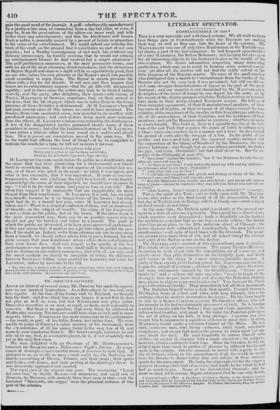MR. DROUET'S CONCERT.
AFTER an interval of several years, Mr. DROUET has made his appear- ance in our musical hemisphere. As a flute-player he has few, very few, equals. At the time of his former visit to England, we thought him the first ; and if we think him so no longer, it is not that he does not play as well as ever, but that NICHOLSON now plays better. DROUET'S execution is as neat, as rapid, as facile, as it is possible to conceive. But there is no question, that every thing he achieved on Wednesday evening, NICFIOLSON could have done as well, and in some respects better. NICHOLSON has more expression in his performance —the result, in part, of his fuller, firmer, and richer tone. We were unable to judge of Daouar's entire mastery of his instrument, from the c'reumstance of all his pieces being in the easy key of G, and searedy ever wandering from it. We heard enough, however, to end able us to say, that, as a concerto-player, he is, if not absolutely first, yet in the very first class. We were delighted with an Overture of Mr. MENDELSSOIIN.S, intended for SHAKSPEARE'S Midsummer Night's Dream. As a spe- cimen of descriptive instrumental music, it deserves to rank high. It pictured to us, as vividly as mere sound could do, the fluttering and nimble assembling of Oberon, Titania, and their Ltrain ; their sports and frolics, and dances, and their parting at the morning's dawn. It was deservedly applauded and encored.
The vocal part of the concert was poor. The everlasting " Lungi dal caro ben," by Madlle. BLASIS—an unmeaning and vapid aria of ROSSINI, by REGREZ, with scarcely three bars sung in tune—and the hacknied "Ricciardo, che veggo," were the principal features of this part of the scheme.


















 Previous page
Previous page